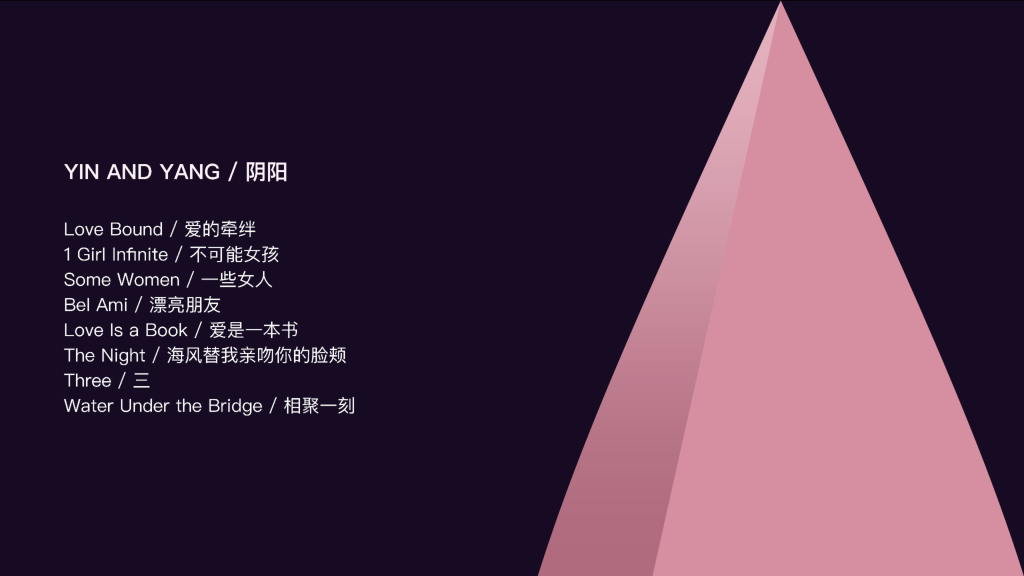We Dream in Fragments: On Sinophone Queer Cinema and Futures – MulanIFF2025

Author: Karen REN
“Queerness is utopian, and there is something queer about the utopian.” Taking inspiration from José Esteban MUÑOZ’s vision of queer futurity, this year’s Yin and Yang programme at Mulan wanders through the many possible worlds that queerness gestures toward. As a curator, I have tried not to define queerness, but to trace its texture across borders, languages, and gazes. This year, we are proud to present one short film programme and four feature-length films, a reassuring presence for those of us working in queer cinema within the Sinophone context, where making queer films often comes with silence, struggle, and risk.
The theme of this year’s shorts programme is “When She Looks at Me,” a collection of films by female filmmakers that center lesbian narratives and intimacies. These works are not only artistically compelling but politically courageous, especially when considered within the context of queer filmmaking in China. While homosexuality was decriminalized in 1997 and removed from the list of mental disorders in 2001, queer representation remains tightly regulated. Since 2016, state policies have explicitly banned depictions of so-called “abnormal sexual relationships,” including homosexuality, across all forms of media, both domestic and imported. For independent queer filmmakers, this means navigating a landscape with obstacles: projects with even a hint of same-sex intimacy often face immediate rejection, forcing directors to work with minimal budgets, guerrilla tactics, and platforms outside of official approval. This suppression extends beyond film into the digital sphere, where lesbian-focused groups and hashtags have been repeatedly shut down on platforms like Weibo.
Against this backdrop, the four short films in this year’s programme approach lesbian cinema from distinct perspectives. Love is a Book explores the tragic undertones and emotional ambiguity of queer intimacy through LAI Yuqing’s experimental yet poetic lens. In The Night, ZHANG Lin captures the fragile emotions of adolescent longing with a melancholic and restrained touch. Three reflects on the Asian American experience through Amie SONG’s gentle and observational eye. Finally, Water under the Bridge examines dating app culture and small-town queer life, carried by ZHANG Yichuan’s fluid pacing and sharp, evocative dialogue.
Another aspect I would like to highlight is the transnational turn in Sinophone queer cinema. Over the past decade, queer filmmakers and scholars from mainland China, Taiwan, Hong Kong, and the wider Chinese diaspora have increasingly engaged with global queer discourses. As a result, we have seen a shift from limited, localized storytelling to narratives shaped by cross-border intimacy. Hong Kong cinema, for instance, has long embraced transnational identities through queer-coded genres, from 1930s Huangmei opera to the cosmopolitan experiments of the 1980s New Wave, offering alternative models of Chineseness that move beyond nationalist frames. This year’s programme reflects that shift. Love is a Book was partially shot in Cambodia, while Three was made in the United States, two films that complicate and expand our understanding of Sinophone queer subjectivity. For our feature-length selections, I have continued to follow this transnational thread, seeking stories that ask what it means to be queer across geographies and languages.
GENG Jun’s Bel Ami, winner of several awards at this year’s Golden Horse Awards, offers a portrait of queer life in rural China. At its heart is the complicated reality of lavender marriages, arrangements shaped not by shared desire but by survival. Unlike their Western counterparts, these marriages are steeped in uniquely Chinese social pressures and family obligations. In 1 Girl Infinite, Lilly HU traces the blurred lines between desire and identity through a story shaped by dislocation. By exploring the fluidity of sexuality, the film captures the quiet fragility of queer love stretched across in-between spaces of becoming and unfinished selves.
This sense of in-betweenness also pulses through Shanshan CHEN’s Love Bound, an intimate documentary where a visa application becomes a site of longing and uncertainty. The film brings into view the lives of queer Chinese activists living abroad, particularly in the UK, and the emotional weight of exile they carry with them. Quen WONG’s Some Women shifts the lens to Singapore, where trans lives unfold across lines of gender, language, and migration. Featuring trans women, some of whom are Chinese dissidents, the film reveals a world where identity is constantly in motion. Through voices that move between English, Mandarin, Hokkien, and Cantonese, Some Women becomes not just a portrait of trans experience, but a multilingual meditation on memory and home.
In these films, we witness more than stories, we witness lives unfolding in the fragile spaces between visibility and erasure, hope and struggle, silence and song. They remind us that queerness is not merely an identity, but a restless becoming. Cinema holds the power to question the boundaries that confine us and to imagine futures that are unapologetically alive. I would like to close with a line from the Chinese queer classic East Palace, West Palace: “The convict loves her executioner, the thief loves her jailer. We love you. We have no other choice.” May this programme be a space of listening, witnessing, and dreaming together.




